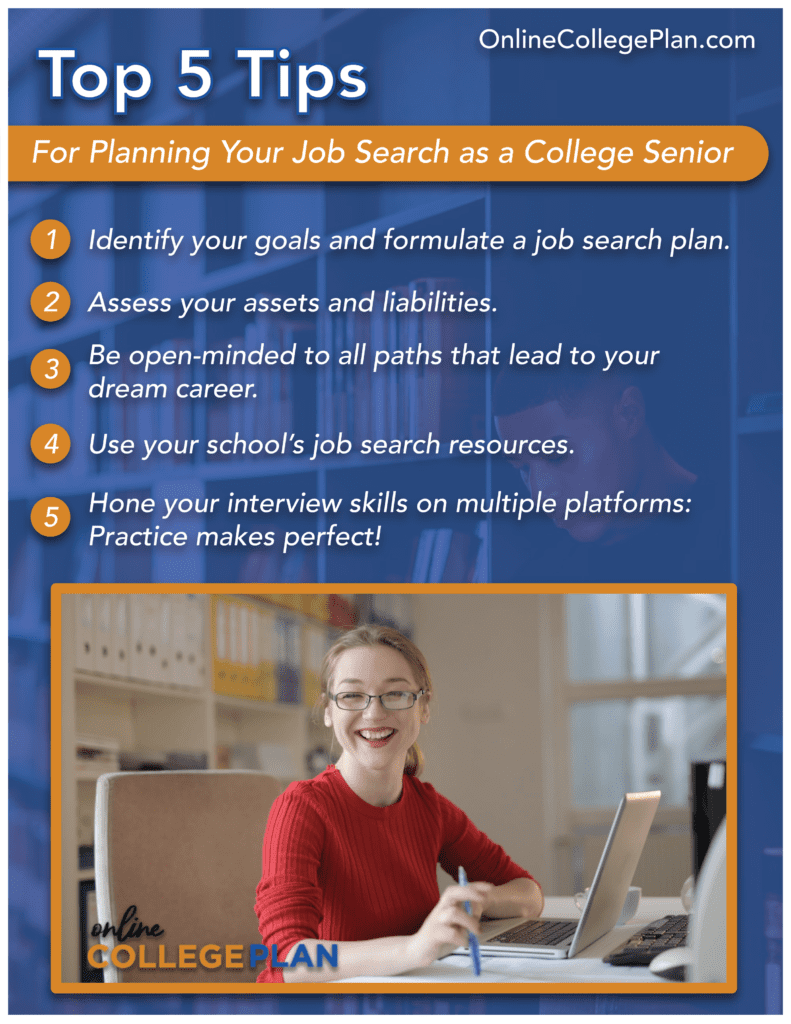Planning for your Job Search
Find your degree
By Jennifer W. Eisenberg

When should you start your post college job search? How should you approach it? At what point are you hopelessly behind in the job search game? The good news is that you do not have to wait until graduation to start your job search. You can start right now, before graduation and be ahead of the game. These five job search tips are meant to give you an edge in the process. Just remember that making a plan is a five-step process: setting goals; developing a process for goal achievement; outlining the activities of that process; prioritizing the activities; and creating a timeline for achieving those goals.

Identify your goals and formulate a job search plan.
In all of the excitement and activity of your senior year, it can be easy to forget how quickly time flies! Don’t lose sight of why you went to college in the first place and why you chose the major you did. When you begin your job search in your senior year of college, the first step should be to identify your goals and how you will incrementally reach them. Devising a strategy will help you feel grounded and prepared for life beyond the college campus; you’ll be pursuing the future for which you’ve worked so hard.
As you embark on your job search in your senior year, a solid first step in job-hunting is assessing which skills make you stand out in your respective field. No matter what has been your specific course of study, there are always particular skills that are considered highly valued in the job market. For example, if you are a graphic design major eager to become an animator, you’ll want to create a portfolio you know highlights how you have learned to be charming and subtle in your layout and design. If you are a journalism major, compile the writing that highlights your editorial eye and sharp copy. In short: you need to come off as eagerly prepared for professional life.
The college senior job search should entail some initial field research on where you’d like to work. Ask yourself questions such as, what is my dream job? What companies would have my dream job? Where can I be hired with my education and background? How far am I willing to travel for a position? What is my desired five or 10-year career trajectory? Get all of these questions into a visual format you can keep referring back to. As your job search commences over your senior year, you may want to revise these answers as necessary for your job search. It is okay for your goals and vision to shift; this is a starting point exercise to visualize what you want to achieve.

Assess your assets and liabilities.
This is a key part of the process where you look at the resources available to you as an individual and how they relate to your goals. You should also consider areas where you tend to fall short and how you can best portray these aspects to potential employers. Your main personal asset in the job search is your network. Who do you know? Who do they know? How can they help you get where you want to be? LinkedIn is a good place to keep track of any competencies you have picked up while in school or at a job while in college. Are you a whiz with inventory? Excel at Excel? Get a boss or a coworker to endorse you in a skill. This looks good to potential employers and is often overlooked by those looking at the job market. Also, be sure to list these skills and other accomplishments from college on a “master resume” where you track everything so that you can tailor each application to the individual position. It is worth considering printing business cards for networking purposes. There are few avenues that aren’t worth exploring in this area. Put your family to work, working their network, too. You never know who knows someone in your area until you ask.

Be open-minded to all paths that lead to your dream career.
As a college senior applying for a job before graduation, it is highly worthwhile to find ways to build your field experience. Senior year may seem overwhelming, but it will be worth the extra time and energy. First, determine how many hours a week / month you are able to devote to some extracurricular work in your field, without letting your grades slip, of course. Among these field-work opportunities may be an internship, volunteer work, or a part-time paid position. Many college students secure work during their winter and spring breaks from school.
An internship is a fantastic way to apply your coursework to a practical, real-life professional setting. Start a search early in your senior year for posted internships in your field of interest. At the same time, you might touch base with specific companies you are interested in working for; there may not be a formal internship opportunity, but it’s possible they’ll find a few hours of work for the right senior college student who is looking for a job.
Another way to get involved in your senior year is through volunteer work. Depending on your location and college major, most fields have opportunities to gain experience in a mutually worthwhile arrangement. This is another search for which your career services office will be able to offer assistance; these professionals have in-depth knowledge of both the surrounding area of the college and which companies have a relationship with the school. Additionally, they will be able to connect you with alumni who have also worked or volunteered for those companies.
Save your money! While a senior in college, create as much financial cushioning for yourself as possible. If circumstances change, and you are still applying for jobs after graduation, you will be less panicked with a little money in the bank. If possible, prepare to move in with family, roommates, or however else may be possible so that this interim will cause the least financial strain. It is never too soon to save, so start today! If you are worried about school loans, contact the lenders to find what repayment options they have; most lenders have a post-graduation grace period for undergraduate loan repayment. Once this grace period is over, there are options such as income-based repayment or economic hardship forbearance.

Use your school’s job search resources.
Among the most useful offerings your college provides is a career services department. The people in this department provide guidance on preparing for your first career. This guidance is typically in the form of resume writing help, interview tips, networking contacts in your field, and more. Additionally, this department will help you focus your goals and plan your job search in your senior year. Career services will also be resourceful in connecting you with alumni who may personally know of job openings or know people who do. Our list of 30 Career Tools and Life Hacks may prove useful as well!
Most colleges will hold at least one (usually more) of what is known as a “career fair.” College Career fairs consist of multiple company representatives gathered to meet and greet attending college students. Before the career fair, take some time to research which companies will be attending, and whether there are any of particular interest to you; if so, do some detailed research on the company’s current ongoings and decide how you might be a fit. When you arrive at the career fair, introduce yourself to companies of interest, provide a resume if you have one, and share information about your senior year job search. After the career fair, take notes on the experience, what you discussed with the representatives, and general impressions about the career fair itself; when you write your follow-up emails to company representatives, these notes will function as a point of helpful reference for optimal email personalization.
See Also:
How to Plan Your Job Search During Senior Year of College
Guide to Getting Hired After College
Planning for Your Career After College

Hone your interview skills on multiple platforms: Practice Makes Perfect!
With the advent of new media platforms, it is important to keep your tech skills sharp. This is especially true when you are a senior college student looking for a career position. In the last few decades, the modes of interviewing have evolved to include phone, in-person, and video formats. Depending on the field and position, prospective candidates may endure multiple interviews in all three of these formats. In order to show your best self to interviewers, each format requires you to maintain your professionalism in different ways. It is essential for you to practice with friends, colleagues, professors, or other people you feel will give constructive feedback. Are you actively listening or waiting to talk? Do you gesticulate to the point of distraction? Are you maintaining the right level of contact? These skills can (and should) be practiced in your senior year college job search.
Companies often conduct phone interviews as a first phase of identifying top candidates. This step in the recruitment process identifies who is qualified enough for a second interview. In some cases, this is a brief conversation that determines any candidate disqualifiers; for example, if the position is now only going to be seasonal, the hiring managers need to know who is unwilling or unable to fulfill the role on these terms. The phone interview can also be a brief conversation about the candidate’s background, technical skills, goals, and more. Don’t underestimate the importance of first impressions, even over the phone. Eliminate any distractions around you, turn off your phone notifications, and otherwise ensure an environment where you can focus on the phone conversation at hand. The College Student’s Guide to Interviews can help you to think about how to plan for your interview process.
Once you’ve advanced to a second interview, the company may opt to conduct a video interview; the reason for this option may be logistical, e.g., you are currently in college and the company is located far from your school. If you are invited for a video interview, preparation is necessary to make it a success. First, make sure you download and familiarize yourself with the software requested for the interview; test this technology by connecting with others, using the different features, and anticipating any technical issues that could arise. Second, find a space for the interview where you will not be interrupted or distracted; most libraries have sound-proof rooms you can use for this purpose. Do not procrastinate on securing these details!
No matter what media format your job interview, your preparation will look the same. Research the company, write down the important discussion points you want to cover, and be specific about why you want to work for this particular company; in a competitive job market, generic pleasantries will not make you stand out. Make the interview as much about them as it is about you. In addition to reading their website, do a search of press coverage or social media worth mentioning in your interview. Before any interview, practice describing your background, skills, career goals, strengths, and weaknesses; this will inevitably be asked of you, be prepared with succinct and confident responses. If possible, secure someone in your field with whom to practice mock interviews; a seasoned professional will be able to offer guidance and critique on how you are presenting yourself.

In conclusion, the process of getting a job is filled with twists and turns and will quite literally change your life. A skosh of planning in the process can help you face this life-altering event with aplomb and grace. Hopefully, we have illuminated the steps that go into the process and made an easy to follow map for how to proceed. With a strong resume, brushed-up interview skills, an awareness of your strengths and weaknesses, and a solid idea of what your endgame is, there is no reason that this process shouldn’t be reasonably smooth.
